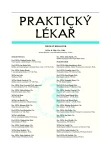Relapse prevention treatment of addictive diseases
Authors:
K. Nešpor 1; A. Scheansová 2
Authors‘ workplace:
Odděleni léčby závislostí – muži
Primář: MUDr. Karel Nešpor, CSc.
Psychiatrická léčebna Bohnice, Praha
Ředitel: MUDr. Martin Hollý
1; Institut postgraduálního vzdělávání ve zdravotnictví, Praha
Ředitel: MUDr. Zdeněk Hadra
2
Published in:
Prakt. Lék. 2010; 90(8): 483-485
Category:
Of different specialties
Overview
Relapse prevention is a process which finds application primarily in the treatment of alcohol dependence and and in the combined dependence on alcohol and other substances. It can however be used in other areas. We offer here an overview of some ways to make the system more understandable for patients. The same or similar processes can be used in three ways:
- to prevent the risky of mental states and craving,
- to manage risky mental states, and
- to cope with craving.
Preventive use of these procedures is beneficial in itself. It also allows learning these procedures well. Then they can be used in situations where the cognitive functions are weakened eg under the influence of strong emotions or in craving.
Key words:
Relapse prevention, addictive diseases, craving, mindfulness, lifestyle.
Sources
1. Bennett, M.P., Lengacher, C. Humor and Laughter May Influence Health: III. Laughter and Health Outcomes. Evid. Based Complement Alternat. Med. 2008, 5(1), p. 37-40.
2. Bowen, S., Witkiewitz, K., Dillworth, T.M, et al. The role of thought suppression in the relation between mindfulness meditation and alcohol use. Addict. Behav. 2007, 32(10), p. 2324–2328.
3. Irvin, J.E., Bowers, C.A., Dunn, M.E. et al. Efficacy of relapse prevention: a meta-analytic review. J. Consult. Clin. Psychol. 1999,67(4), p. 563-570.
4. Larimer, M.E., Palmer, R.S., Marlatt, G.A. Relapse prevention. An overview of Marlatt’s cognitive-behavioral model. Alcohol Res. Health 1999, 23(2), p. 151-160.
5. Marlatt, G.A., Gordon, J.R. Relapse Prevention: Maintenance Strategies in the Treatment of Addictive Behaviors. NewYork: Guilford Press, 1985, 480 p.
6. Nešpor, K. Organizace Anonymní alkoholici přestavuje efektivní pomoc závislým. Alkoholizmus a drogové závislosti (Bratislava) 2002, 37, s. 167-175.
7. Nešpor, K. Léčivá moc smíchu. Praha: Vyšehrad 2007, 160 s.
8. Parks, G.A., Marlatt, A. Relapse Prevention Therapy: A Cognitive-Behavioral Approach. The National Psychologist 2000, 9(5). http://nationalpsychologist.com/articles/art_v9n5_3.htm, accessed 21.3.2010
9. Prochaska, J.O., DiClemente, C.C. Stages and processes of self-change of smoking: toward an integrative model of change. J. Consult. Clin. Psychol. 1983,51(3), p. 390-395.
10. Wee, C.C., Davis, R.B., Phillips, R.S. Stage of readiness to control weight and adopt weight control behaviors in primary care. J. Gen. Intern. Med. 2005,20(5), p. 410-415.
11. Witkiewitz, K., Marlatt, G.A. Relapse prevention for alcohol and drug problems: that was Zen, this is Tao. Am. Psychol. 2004, 59(4) p. 224-235.
Labels
General practitioner for children and adolescents General practitioner for adultsArticle was published in
General Practitioner

2010 Issue 8
- Advances in the Treatment of Myasthenia Gravis on the Horizon
- Hope Awakens with Early Diagnosis of Parkinson's Disease Based on Skin Odor
- Memantine in Dementia Therapy – Current Findings and Possible Future Applications
- Memantine Eases Daily Life for Patients and Caregivers
- Possibilities of Using Metamizole in the Treatment of Acute Primary Headaches
-
All articles in this issue
- Human biomonitoring – its importance and application for evaluating population exposure to environmental chemicals (toxins)
- Arrhythmias in patients with metabolic syndrome and critical limb ischemia
- Relapse prevention treatment of addictive diseases
- Spontaneous intracranial hypotension
- Pancreatic cancer: Molecular biology and early detection
- Has the time come for more personalised medicine in psychiatry?
-
Evolution and evolutionary theory for physicians.
VIII. Evolution of the human brain - Zinc and its relation to prostate tumours
-
How can be quality of care successfully measured:
an example of good practice from Denmark - Family caregivers of patients with dementia
- Physical activity as a part of cardiovascular disease prevention in the general practitioner’s surgery
- Occurrence of symptoms and risk factors for obstructive sleep apnea in patients examined for cardiac arrhythmias through Holter ECG monitoring
- General Practitioner
- Journal archive
- Current issue
- About the journal
Most read in this issue
- Spontaneous intracranial hypotension
- Zinc and its relation to prostate tumours
- Human biomonitoring – its importance and application for evaluating population exposure to environmental chemicals (toxins)
- Physical activity as a part of cardiovascular disease prevention in the general practitioner’s surgery
